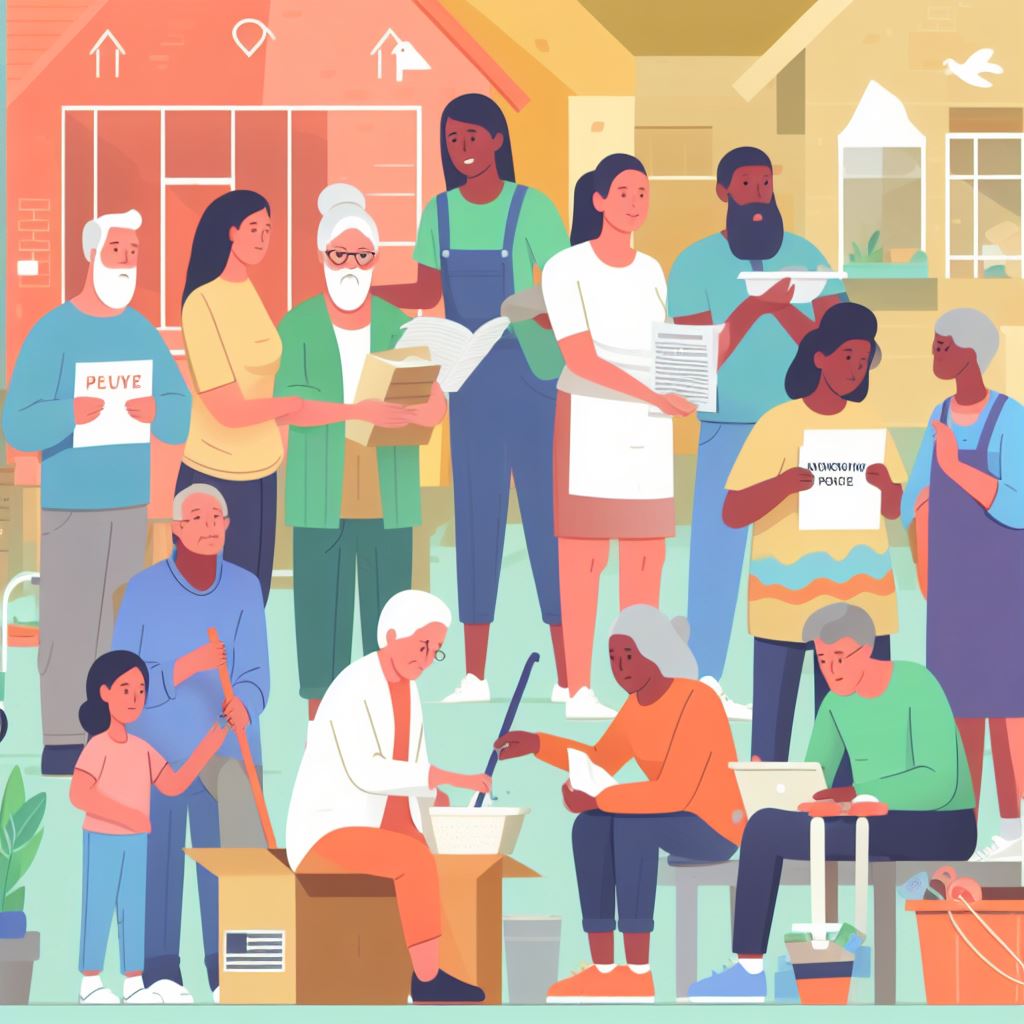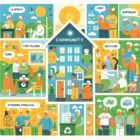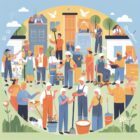Decoding Tenant’s Duties in Subsidized Housing Programs

Are you a tenant in a subsidized housing program? Do you know all of your responsibilities and duties? It’s time to decode them!
In this article, we will uncover the secrets of your lease agreement, rent payment obligations, and maintaining a safe and clean living environment.
We’ll also explore reporting maintenance issues and complying with program rules.
Get ready to become a savvy tenant and empower yourself with knowledge!
Key Takeaways
- Familiarize yourself with the lease agreement to understand tenant obligations.
- Consistently meet rent payment obligations to avoid fees or penalties.
- Maintain a safe and clean living environment by disposing of trash properly and reporting pest infestations.
- Promptly report maintenance and repair issues to ensure timely repairs and protect the safety of tenants and neighbors.
Understanding the Lease Agreement
You need to understand the lease agreement when participating in subsidized housing programs. The lease agreement is a legally binding document that outlines the terms and conditions of your tenancy. It’s crucial to familiarize yourself with its contents to ensure that you fulfill your obligations as a tenant.
The lease agreement will typically include information about your rent, utilities, and any additional fees or charges. It will also specify the duration of your tenancy and the consequences of breaking the lease early. Understanding these terms will help you manage your finances effectively and avoid any unexpected expenses.
Moreover, the lease agreement will outline your responsibilities as a tenant. This may include keeping the rental unit clean and in good condition, adhering to noise regulations, and respecting the rights of other tenants. By understanding these obligations, you can maintain a positive living environment for yourself and your neighbors.
If you have any questions or concerns about the lease agreement, it’s important to reach out to your landlord or the housing authority. They can provide clarification and guidance to ensure that you have a clear understanding of your rights and responsibilities.
Meeting Rent Payment Obligations
To ensure a smooth tenancy, it is crucial to consistently meet your rent payment obligations in subsidized housing programs. By fulfilling this responsibility, you not only maintain a good standing as a tenant but also contribute to the overall stability of the program. To help you understand your rent payment obligations, here is a breakdown of the key factors:
| Rent Payment Obligations | Description |
|---|---|
| 1. Amount Due | This is the total amount of rent you are required to pay each month. It is typically based on your income and the program’s guidelines. |
| 2. Payment Schedule | You must pay your rent on time, usually by a specific day of the month. Late payments may result in fees or penalties. |
| 3. Accepted Payment Methods | The program may specify acceptable payment methods, such as electronic transfers, checks, or money orders. Ensure to follow these guidelines. |
| 4. Reporting Changes | If your income or household composition changes, you must promptly inform the program to ensure accurate rent calculations. |
| 5. Communication | Maintain open lines of communication with your housing provider. If you face financial difficulties, they may offer resources or assistance.
Maintaining a Safe and Clean Living Environment
Ensuring a safe and clean living environment is essential for tenants in subsidized housing programs. As a tenant, it’s your responsibility to maintain cleanliness and safety within your unit. This includes keeping your living space free from hazards, such as clutter and debris, as well as ensuring that all appliances and systems are in good working order.
To maintain cleanliness, it’s important to regularly clean your unit, including floors, surfaces, and bathrooms. Dispose of trash properly and promptly, and report any pest infestations to the housing authority. Keep in mind that regular cleaning not only helps to prevent health hazards but also promotes a positive living environment for yourself and your neighbors.
Additionally, take steps to ensure safety within your unit. This includes keeping fire exits clear, testing smoke detectors regularly, and reporting any safety concerns, such as faulty electrical wiring or broken locks.
Reporting Maintenance and Repair Issues
Maintaining a safe and clean living environment is crucial, and part of this responsibility involves promptly reporting any maintenance and repair issues. By promptly reporting these issues, you ensure that necessary repairs are made in a timely manner, preventing further damage and potential hazards.
Here are five important reasons why reporting maintenance and repair issues is essential:
- Safety: Reporting issues such as faulty wiring, leaky pipes, or broken locks helps protect you and your neighbors from potential accidents or injuries.
- Property Preservation: Reporting maintenance problems, such as water leaks or structural damage, allows property management to address them promptly, preventing further deterioration and costly repairs.
- Tenant Satisfaction: Promptly reporting maintenance issues ensures that your living conditions remain comfortable and functional, contributing to your overall satisfaction as a tenant.
- Legal Obligations: Reporting issues promptly fulfills your legal obligations as a tenant, as most housing programs require tenants to promptly report any maintenance or repair needs.
- Community Well-being: Reporting maintenance and repair issues helps maintain the overall cleanliness and functionality of the community, creating a better living environment for everyone.
By promptly reporting maintenance and repair issues, you not only protect yourself and your neighbors but also contribute to the overall well-being of the community.
In the next section, we’ll discuss the importance of complying with program rules and regulations to ensure a harmonious living environment.
Complying With Program Rules and Regulations
Follow program rules and regulations to ensure compliance and a harmonious living environment.
Complying with the rules and regulations of subsidized housing programs is crucial for maintaining eligibility and creating a positive community atmosphere. By adhering to these guidelines, you contribute to a safe and respectful living environment for yourself and your neighbors.
Program rules typically cover various aspects, such as income requirements, household composition, and lease agreements. It’s essential to understand and follow these rules to maintain your eligibility for subsidized housing benefits. Failure to comply may result in the termination of your assistance, affecting not only your living situation but also your financial stability.
Additionally, program rules often address issues like noise levels, pet policies, and maintenance responsibilities. By following these regulations, you help create a harmonious living environment where everyone can enjoy peace and privacy. Being mindful of noise levels, properly caring for pets, and promptly reporting maintenance issues contribute to the overall well-being of the community.
Frequently Asked Questions
What Are the Income Eligibility Requirements for Subsidized Housing Programs?
You must meet certain income eligibility requirements to qualify for subsidized housing programs. These programs provide affordable housing options for individuals and families who have low to moderate incomes.
How Can I Apply for a Subsidized Housing Program?
To apply for a subsidized housing program, visit your local housing authority or go online to their website. Fill out an application, providing accurate information about your income, household size, and any special circumstances.
Are There Any Additional Fees or Charges Associated With Living in Subsidized Housing?
There may be additional fees or charges associated with living in subsidized housing, such as utilities or parking. However, these fees are typically based on your income and should be affordable.
Can I Make Modifications to the Unit or Apartment in Subsidized Housing?
You can make modifications to the unit or apartment in subsidized housing. However, there may be restrictions or guidelines in place, so it’s important to check with your housing program or landlord beforehand.
Are There Any Restrictions on the Number of Occupants Allowed in Subsidized Housing Units?
Yes, there may be restrictions on the number of people allowed in subsidized housing units. It’s important to check the specific rules and regulations of your program to understand any limitations on occupancy.



